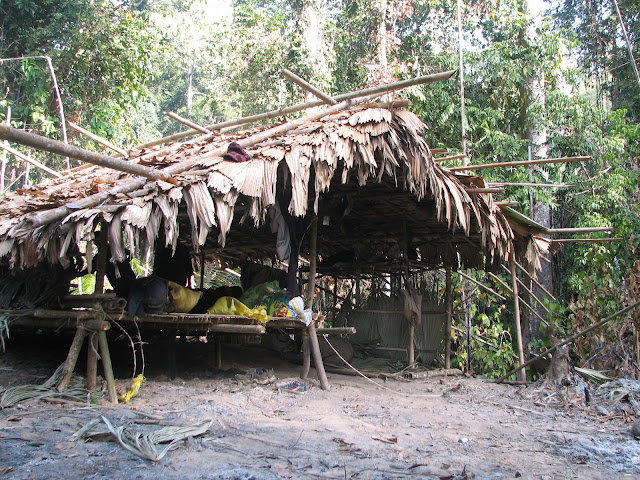Tokalo : Day Twelve
Day Twelve is about falling leaves and getting off the serious track
I wake up at 6.35 am to a hoolock gibbon song. Either
we love to set camps near their homes or they love to visit our camps or there
are simply many of them here! Yesterday NT informed me of Mawhre being the only
other forest patch in Maraland which houses hoolock gibbons. A little later, I
see drongos, bulbuls and hoary bellied Himalayan squirrels at the camp.
As we sit and chat 2 of our colleagues who had
left a day earlier to get food turn up with rice, sugar and Burmese cigars.
They had spent the night at the previous camp without either food or blanket.
Before they arrive 2 others have moved to get food from Ralie- the nearest
habitation on the other side of the border. I wish I could have accompanied.
The food is late. I sit and chat. I realize the
benefits of being unfamiliar with the language. Not only have I become more patient
but also put in less time cribbing and complaining.
As I walk today I add to the collection of
images of pugmarks and scats. Ja and the Forest Guard are good at this. Hope
the images are fine enough for being identified once I have access to the
internet. After the survey I was told, by someone who knows more about small
carnivores and pugmarks, that images alone do not suffice!
We see traps on the path, real life versions of
the sketches I came across in Parry’s book and at the Aizawl museum. Traps for both
- mammals and birds. These appear to have been crafted after years of practice.
I stop for more than moment to admire the craftsmanship, measure them and wonder
if I should just leave them. We try to see how the one for birds – thankgchep would work and swoosh it goes
up with an imaginary sawa (bird).
After the initial debate in my head I end up destroying each trap I come across.
We, after food, set off, up the river to put up
the posts. We had come down on a different path yesterday. This is the Rala
river. The water is relatively cleaner and paths easier to walk. Well, at least
today. We put up post numbers 29 to 32 and reach Camp 5. Colleagues have
shifted it a little down-stream and we are occupants of what was once a jhum
hut. Tea here and we move ahead for posts 33 and 34 before returning to more tea.
We have got rice, sugar and oil today from the
Burmese village and also gur (jaggery) which we had with tea. It was delicious
and I immediately got transported to the gur I had with Moghiyas – it was Tonga
if I recall fine, somewhere between Vijaypur and Sabalgarh in Sheopur.
The evening meal is super fish cooked in bamboo with oil onion and leaves.
I love the falling leaves, small yellow – green
fellows coming down from the high canopies. They have a grace which comes only
with freedom. Each one comes down in a manner unique to it. Some dangling, some
dancing, some quick while some appear to be in deep thought. As they turn and
twist sunlight caresses them and bestows colours that only it can – adding
beauty to what was already beautiful. I recall wondering if leaves were as much
fun as birds when viewed with binoculars.
We are all feeling the fatigue. Slowly but surely.
Talks of aches and hurts are heard when we get towards sleep or warm ourselves
around fire.
Somewhere amidst all this are we confused over
what the primary objective of the adventure is? The boundary, the socio-economic
survey or else? I too seem to be soaking in the days and not worrying about the
result. A la ‘yeh lamha filhaal jee lene de’.
I am however happy with the clarity in my head, the
briefness in my talks and that dropping of the worrying hat. When you realize
you are one of the 6 billion and take yourself less seriously you get on
rolling. Over the coming years I will realize that the biggest learning from my
life in Mizoram is to not take myself seriously.
John Haines in Moments
and Journeys writes - When life is
simplified, its essence becomes clearer, and we know our lives as part of some
ancient human activity in a time measured not by clocks and calendars but by
the turning of a great wheel, the positions of which are not wage-hours, nor
days and weeks, but immense stations called Spring, Summer, Autumn, and Winter.
I go to sleep after writing few pages. In spite of
the fatigue love the pencil flowing on paper in the soft glow of the
candle-light. I wake up to some noise around the fire place.
My watch shows 10.30 pm; 3 colleagues are chatting. They, like me, appear to have
got over their first round of sleep.




Comments
Post a Comment